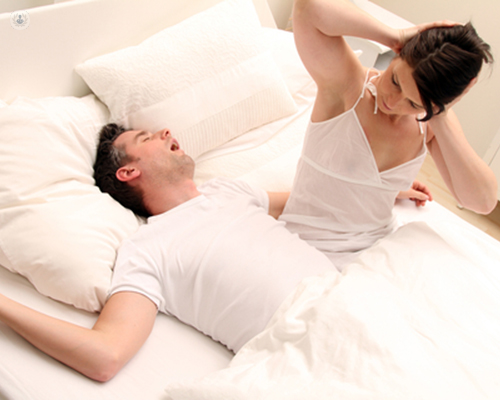What is the difference between snoring and sleep apnoea?
Written in association with:Top Doctors recently caught up with esteemed respiratory and sleep physician, Dr Sandip Banerjee, who, in our latest article here, details the main differences between snoring and sleep apnoea, and tells us when we should get checked out for sleep apnoea.

What is the difference between snoring and sleep apnoea?
The difference is very subtle. The basic pathology of both is narrowing of the upper airway, which is based right behind the tongue. Narrowing of the airways leads to sounds being produced when inspiring and expiring.
These sounds produce musical connotations, which in turn leads to snoring. Occasionally, these episodes of the narrowing of the upper airway can lead to partial blockage and collapse. This is defined as sleep apnoea.
The main difference between snoring and sleep apnoea is that, in sleep apnoea, there is a reduction in the oxygen levels associated with arousal in your sleep. Therefore, a person who suffers from sleep apnoea will experience fatigue and non-refreshing sleep, whilst people who simply snore at night will, on the other hand, experience refreshing sleep.
Who is most likely to suffer from sleep apnoea?
There is a clear association between sleep apnoea and obesity. We also know that there is a greater prevalence of sleep apnoea in people who have underlying atrial fibrillation or poorly controlled diabetes.
In addition, if you have unrefreshing sleep with symptoms of daytime fatigue and tiredness, one should rule out the possibility of underlying sleep apnoea.
What are the subtle signs of sleep apnoea to look out for?
The most common symptom is the partner of the patient complaining of loud snoring, which is intermittently associated with breathing pauses. These breathing pauses can last between 10 seconds up to a minute. This is understandably quite scary and disturbs the partner.
In addition, the other symptoms that we commonly associated with sleep apnoea are symptoms of waking up in the morning with headaches, and thereafter feeling tired and fatigued throughout the day.
Very frequently, this is associated with sleepiness during the day, where patients need additional naps during the day. Other symptoms include poor memory and concentration levels, and a decrease in one’s sexual drive.
How do you know if you have sleep apnoea if you live or sleep alone?
The most common presentation in people who live alone is sudden episodes of waking up at night with a choking or gasping sensation. Frequently, the other presentation is waking up at night to have to go to the bathroom several times at night.
For an individual living by themselves, if they notice any of the symptoms mentioned that are accompanied by a sensation of choking and palpitations experienced at night, they should be seeking medical help to see if there is a case of underlying sleep apnoea.
What should you do if you suspect you have sleep apnoea?
You should immediately seek medical advice. Typically, once the patient outlines their symptoms, a respiratory polysomnogram will be carried out on the patient. We can then institute immediate treatment in the form of a CPAP device.
If you are unable to cope with a CPAP device, you can even consider seeking medical advice from an orthodontist to see which device can be used to help.
To book a consultation with Dr Sandip Banerjee, simply head on over to his Top Doctors profile today.



